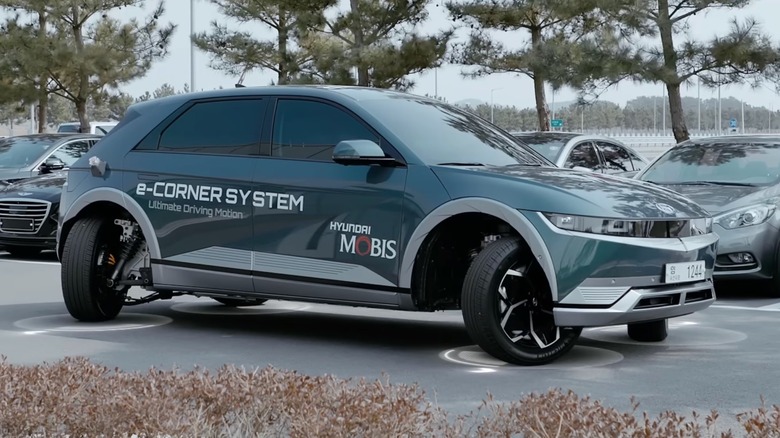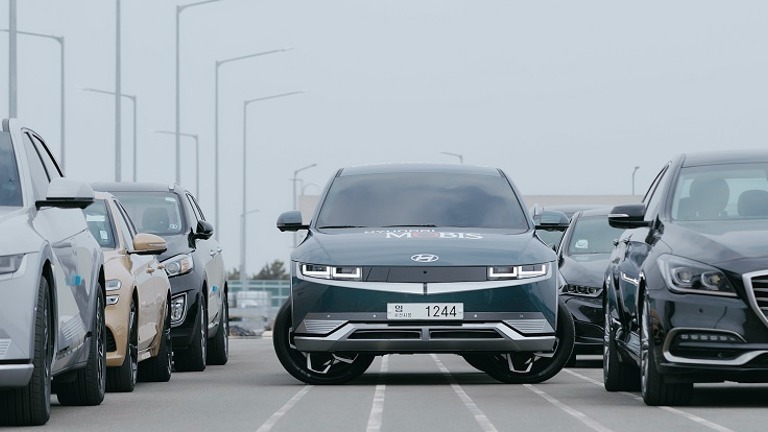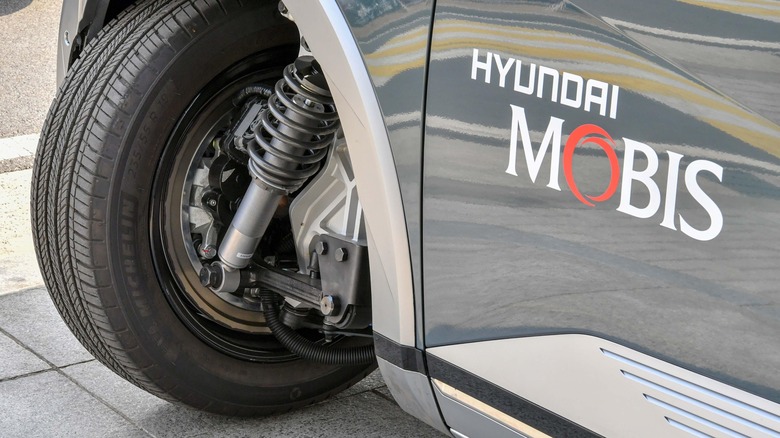This Crab-Walking Hyundai EV Could End Our Parallel Parking Nightmares Forever
Picture the scene: You're gridlocked in traffic and the car behind you breaks down. An incident somewhere in front means you're stuck there until everything clears up. That is, unless your car's fitted with Hyundai Mobis' new e-Corner System. Then you can just rotate all of your wheels 90 degrees, slide out sideways, and be on your way. The new system isn't just some weird, never to be seen, feature showing up on a random concept vehicle. The South Korean company actually fitted it to an Ioniq 5 EV, and took it out on public roads to demonstrate just how well it works.
With the Mobis system, thanks to clever packaging of brake by wire, steer by wire, the dampers, and an in-wheel motor, all four wheels can rotate up to 90 degrees either together or independently, enabling a feature Hyundai refers to as "crab walking." This creates a whole range of new maneuvering possibilities and is likely to make life a little easier for people who spend most of their time driving in cities.
In addition to escaping situations like the one we described above, the new system can be used to slot directly into a parking spot you've pulled level with. You can also spin a car on the spot with it, or pivot around "any point" on the car's central axis. Other maneuvers include "diagonal driving" which moves the car at a 45-degree angle and can help avoid obstacles.
A similar concept has existed for decades
When Hyundai says that the "innovative technology has never been mass-produced anywhere in the world," it is technically correct, but a similar parking solution dates back to the 1930s. The almost century-old system doesn't involve four independently rotating wheels, but rather a "fifth wheel" which can be wound down and produce an effect similar to the Mobis e-Corner System's pivot feature. The "fifth wheel" allowed drivers to avoid parallel parking by swinging their front end into a spot, winding down the fifth wheel, and then using that to swing the back end in. It could even be used to rotate a car 360-degrees, so you could maneuver out of a tight driveway with it.
The fifth wheel could also be used as a spare tire, but this didn't save any trunk space. The mechanism it relied on took up an awful lot of room, which is one of the reasons it never caught on. On the other hand, Hyundai's new system is unlikely to require driver's to trade storage space for easy maneuverability — so it has far more of a chance. Other vehicles have also had four-wheel steering for added mobility in the past. A more recent example is the Hummer EV, which has a "crab walk" talent similar to the one Hyundai is mentioned — though the Hummer's wheels can't swivel a full 90 degrees.
There are other solutions to your parking woes
Anxiety, and a lack of ability, around parallel parking is one of the most common driving woes — so naturally automotive manufacturers have come up with a number of solutions that make life easier in this department. While we haven't quite got full self-driving yet, technology capable of parking your vehicle for you has existed for years now. Sometimes it's fitted as standard on vehicles, while other times it comes as an optional extra.
While the AI-driven driver aid may be more established, it isn't necessarily better. It still parallel parks like a human would, so it needs to pull ahead of the spot it wants to go into. This is an issue in heavy traffic, as an incompetent or impatient driver could still pull too close to the back of your car and interrupt the maneuver. Equally, standard parallel parking requires a reasonable amount of room in front of, and behind, the car. If you're slotting straight in from the side, you could, in theory, make do with a couple of inches on either end of your vehicle. This could potentially create more spaces and ease parking problems in overcrowded cities.
Hopefully, we'll be seeing Hyundai Mobis' E-corner system on production cars soon, though the automaker isn't making any commitments. In a statement, Hyundai Mobis' Cheon Jae-seung, head of FTCI (Future Technology Convergence Institute), says: "We will secure different types of customized mobility solutions that can be applied in autonomous driving and PBVs to solidify our vision of reaching new heights as a mobility platform provider."


